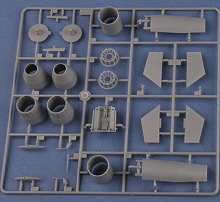November 24, 2017
|
Friday words #96
|
3113 hit(s)
Here in the US, it's Black Friday, a now-traditional shopping day. We have family and friends who work in retail or at Amazon, and it's a busy, busy day for them. May they get a break sometime today. Also and for those interested, the Oxford Dictionaries blog has a history of the term Black Friday.
 A fun new-to-me term today is kitbashing. This is a term from the domain of people who create models of cars or planes or trains or spaceships or whatever. The default way to create models is to get a kit and follow the instructions and come out with something that looks like the picture on the cover. But you can also kitbash it by grabbing bits and bobs out of other model kits (greebles) and decorate up your model to make it cooler. A kind of opposite is scratchbuilding, where you manufacture all the parts yourself. A fun new-to-me term today is kitbashing. This is a term from the domain of people who create models of cars or planes or trains or spaceships or whatever. The default way to create models is to get a kit and follow the instructions and come out with something that looks like the picture on the cover. But you can also kitbash it by grabbing bits and bobs out of other model kits (greebles) and decorate up your model to make it cooler. A kind of opposite is scratchbuilding, where you manufacture all the parts yourself.
Here's an example of kitbashing where the modeler used parts from some plastic kits to add exotic touches to a Nerf gun:
Kitbashing is fun for hobbyists, but it's also done by people who create models professionally, as for movies. Someone at work was recently telling a story about the original Star Trek series, which in its day was loooow-budget TV. The story was that if they needed props on set, a props person would go down to the Goodwill or wherever, and they'd then come back with unusual-looking salt or pepper shakers or something like that. You can see how a bit of imaginative kitbashing and a couple of coats of spray paint could transform a thrift-store treasure into, say, an alien ray gun. More famously, kitbashing was a reason that the models looked so good in the movies 2001 : A Space Odyssey and Star Wars.[1]
I like this word for two reasons. One, I made plastic models a lot as a kid, mostly military equipment, and I eventually got to the point where I could paint the models to look pretty good. But I never learned about kitbashing, which seems like it would have been the next level. It would have been fun—I certainly had lots of random bits floating around. Two, it interests me that the term involves bashing where one might expect mashing (as in mash-up). I can't seem to track down where the term came from or how old it is, but it's old enough that there's a book from 1994 about kitbashing train models.
Moving along, today's etymological exploration is actually not a new-to-me origin, but a new-to-my-wife one. The other day she asked where the word sheriff came from. I kind of knew this, but it warranted further exploration.
 A sheriff is a shire+reeve, a term that goes all the way back to Anglo-Saxon (scírgeréfa). Basically speaking, a shire is another word for a county in England. Think of names like Gloucestershire, Hampshire, and Herefordshire. A reeve is an "administrative agent," i.e., an executive. In medieval England, a reeve was an agent of the king from whom of course all authority derived—the Sheriff of Notthingham in Robin Hood, for example. In the US, the term is used more specifically to mean the A sheriff is a shire+reeve, a term that goes all the way back to Anglo-Saxon (scírgeréfa). Basically speaking, a shire is another word for a county in England. Think of names like Gloucestershire, Hampshire, and Herefordshire. A reeve is an "administrative agent," i.e., an executive. In medieval England, a reeve was an agent of the king from whom of course all authority derived—the Sheriff of Notthingham in Robin Hood, for example. In the US, the term is used more specifically to mean the executive enforcement[2] officer for a county. As Noah Webster has it, "The sherif, by himself or his deputies, executes civil and criminal process throughout the county, has charge of the jail and prisoners, attends courts and keeps the peace." Cue about one thousand Westerns, right?
Like this? Read all the Friday words.
|
 |
|

 |
|
